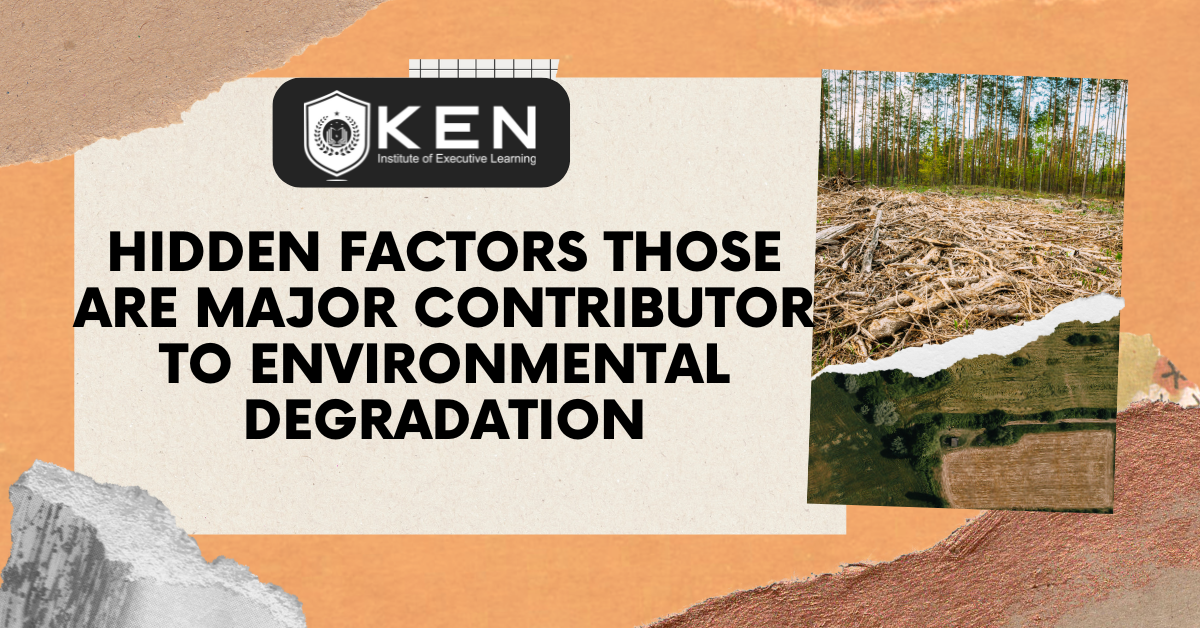
Pollution, industrialization, urbanization, and deforestation are the obvious “Contributors to Environmental Degradation”, Besides these there are some other issues that people might not be widely aware of. Addressing these factors requires a combination of individual actions, industry practices, and policy changes to promote sustainability and reduce the overall environmental impact of human activities.
Hidden Factors: Contributor to Environmental Degradation
Fast Fashion:
The fashion industry is a major contributor to environmental degradation. Fast fashion refers to the rapid production of inexpensive clothing to respond quickly to the latest trends. The production of textiles, especially cotton, often involves heavy pesticide use and significant water consumption. Fast fashion, characterized by quickly produced, inexpensive clothing, often leads to overconsumption and increased waste. The production of textiles and the disposal of old clothing contribute to pollution and resource depletion.
Additionally, the disposal of old clothing contributes to landfill waste. The synthetic materials used in many fast fashion items take a long time to break down, contributing to environmental pollution.

Microplastics in Personal Care Products:
Microplastics are tiny plastic particles, often smaller than 5 millimeters, that are used in various products. Though, these particles are tiny they are a major contributor to environmental degradation. Many personal care products, such as exfoliating scrubs and toothpaste, contain microplastics. These tiny plastic particles when washed off end up in water bodies, posing a threat to aquatic life and potentially entering the food chain.
They can be ingested by marine organisms and accumulate in the food chain, potentially reaching humans.
Online Streaming and Data Storage:
The digital world has an environmental footprint. Streaming videos, and services and storing data in data centers consume a significant amount of energy. The demand for data storage and streaming services contributes to the electricity consumption of data centers, which often rely on non-renewable energy sources.

These data centers contribute to carbon emissions, especially if they rely on non-renewable energy sources. The production and disposal of electronic devices also contribute to electronic waste.
Food Waste:
The amount of food that is wasted globally has significant environmental consequences. Food production requires resources like water, land, and energy. When food is wasted, these resources are also wasted, and the decomposition of food in landfills produces methane, a potent greenhouse gas.
Food production is a major contributor to environmental degradation as it involves the use of resources such as water, land, and energy. When food is wasted, these resources are also wasted. In landfills, decomposing food produces methane. Addressing food waste through better storage, distribution, and consumption practices is crucial for environmental sustainability.
Disposable Coffee Cups:
Disposable coffee cups seem harmless, but they are often lined with plastic to make them waterproof. This makes them difficult to recycle, and billions end up in landfills each year, contributing to environmental pollution.

Using reusable cups or supporting businesses that use environmentally friendly alternatives can help mitigate this issue.
E-waste from Electronics:
The rapid turnover of electronic devices contributes to the growing problem of electronic waste (e-waste). Improper disposal of old electronics can lead to the release of hazardous substances into the environment.
Electronic devices contain various materials, including hazardous substances like lead and mercury. Improper disposal of old electronics can lead to the release of these hazardous materials into the environment, posing risks to ecosystems and human health. Recycling electronics responsibly is essential to minimize e-waste.
Cruise Ship Pollution:
Cruise ships emit significant amounts of pollutants, including sulfur dioxide, nitrogen oxide, and particulate matter. These emissions contribute to air pollution and can harm air quality in coastal areas.
Additionally, the discharge of untreated sewage and ballast water can have negative effects on marine ecosystems. Hence, your cruise trip is also a major contributor to environmental degradation

Inefficient Agricultural Practices:
Certain agricultural practices, such as overuse of fertilizers and pesticides, can lead to soil degradation, water pollution, and harm to biodiversity. Additionally, large-scale monoculture farming can contribute to deforestation.
Runoff from agricultural areas can carry these chemicals into rivers and oceans, harming aquatic ecosystems. Large-scale monoculture farming, where a single crop is grown over extensive areas, can contribute to deforestation and loss of biodiversity.
Balloons and Sky Lanterns:
The release of balloons and sky lanterns might be done for celebratory purposes, and seem like a festive activity, but these items can end up in oceans and other natural habitats, posing a threat to wildlife that may ingest or become entangled in them.
Marine animals, in particular, may mistake balloons for food and ingest them, leading to injury or death. Additionally, the remnants of balloons and lanterns can contribute to litter in natural environments.
Crypto Currency Mining:
The energy-intensive process of mining cryptocurrencies, particularly those that use proof-of-work algorithms like Bitcoin, can have a significant environmental impact. The high energy consumption contributes to carbon emissions.
Mining operations require powerful computers to solve complex mathematical problems, leading to high electricity consumption and carbon emissions. Exploring more energy-efficient blockchain technologies or transitioning to proof-of-stake consensus mechanisms can mitigate these environmental impacts.

Conclusions
Raising awareness about these less-discussed environmental issues and adopting more sustainable practices in daily life can contribute to a healthier planet.
For the top-level online Environment & Sustainability courses, Industrial safety, Fire safety, and Mechanical Engineering courses, more advice, or any personalized information get in touch with us
At: info@keneducation.in, or visit our website www.keneducation.in or call us on +917569034271
Let’s connect on Facebook, YouTube, LinkedIn, and Instagram.

